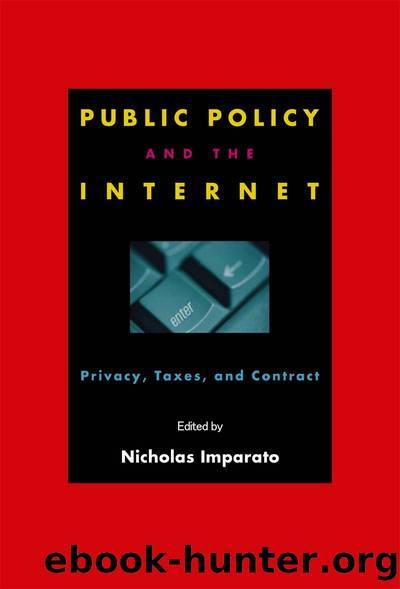Public Policy and the Internet by Mary J. Cronin & Nicholas Imparato

Author:Mary J. Cronin & Nicholas Imparato [Cronin, Mary J. & Imparato, Nicholas]
Language: eng
Format: epub
Tags: Public Policy, Political Science, General
ISBN: 9780817998967
Google: 5fJWAgAAQBAJ
Goodreads: 19524429
Publisher: Hoover Institution Press
Published: 2000-05-01T00:00:00+00:00
SOME CAVEATS: DUBIOUS ARGUMENTS
Before leaving the discussion of the state sales and use tax it is appropriate to warn the reader of arguments that the author believes to be fallacious. Most involve failure to apply elementary economics correctly.
âRemote vendors do not consume services.â Some argue that remote vendors should not be required to collect use taxes because they do not consume public services provided by the market state. This view reflects a misunderstanding of the benefit principle of taxation. The sales and use tax is levied primarily to finance services provided to households, not to finance services provided to business firms doing business in the taxing state. Thus it should apply equally to all taxable goods and services consumed in the state, not only to those sold by local merchants. (The invalidity of the argument cited above can be seen by replacing reference to the sales and use tax with reference to an excise on tobacco products used to finance health care for smokers. No one would seriously suggest that cigarettes sent by mail order from another state should not be taxed just because they are sold by a vendor that receives few services in the taxing state.)40
âShipping and handling compensate for the lack of use tax.â Some argue that the need to pay charges for shipping and handling, which are higher for shipments to individual customers than for bulk shipments to local merchants, compensates for the lack of use tax on remote sales. This argument is obviously invalid in the case of digitized content; there are no shipping and handling charges to offset the lack of use tax. But it is equally invalid in the case of tangible products. The easy case involves a comparison of two remote vendors, one with nexus and one without. Shipping and handling costs may be comparable, but one collects tax and the other does not. Finally, consider the more difficult case, a remote vendor compared with a Main Street merchant. If costs are higher for remote commerce, that is prima facie evidence that the tax exemption induces economic inefficiency; costs are being incurred that would not exist if tax policy were neutral.
The previous two arguments (involving lack of services to remote vendors and shipping costs) may not be convincing to non-economists. But consider the following. Suppose someone suggested that sales (or use) tax should be collected when Americans buy foreign-made cars from American merchants but not when they order them directly from a foreign manufacturerâor that sales tax should be collected on cars made in the United States but not on cars made abroad. Few would think these suggestions make sense. Yet they are exactly analogous to arguments that purchases from out-of-state vendors should not be taxed; that is, foreign merchants and car manufacturers do not consume services provided by the American states and they incur substantial shipping costs getting their products to American markets. Yet we do not consider either fact in deciding whether to collect sales or use tax on foreign-made cars.
Download
This site does not store any files on its server. We only index and link to content provided by other sites. Please contact the content providers to delete copyright contents if any and email us, we'll remove relevant links or contents immediately.
Kotlin in Action by Dmitry Jemerov(19348)
Grails in Action by Glen Smith Peter Ledbrook(16801)
Sass and Compass in Action by Wynn Netherland Nathan Weizenbaum Chris Eppstein Brandon Mathis(14285)
Configuring Windows Server Hybrid Advanced Services Exam Ref AZ-801 by Chris Gill(7521)
Azure Containers Explained by Wesley Haakman & Richard Hooper(7515)
Running Windows Containers on AWS by Marcio Morales(7066)
Microsoft 365 Identity and Services Exam Guide MS-100 by Aaron Guilmette(5451)
Microsoft Cybersecurity Architect Exam Ref SC-100 by Dwayne Natwick(5291)
Combating Crime on the Dark Web by Nearchos Nearchou(5044)
The Ruby Workshop by Akshat Paul Peter Philips Dániel Szabó and Cheyne Wallace(4720)
Management Strategies for the Cloud Revolution: How Cloud Computing Is Transforming Business and Why You Can't Afford to Be Left Behind by Charles Babcock(4563)
Python for Security and Networking - Third Edition by José Manuel Ortega(4296)
The Age of Surveillance Capitalism by Shoshana Zuboff(4274)
Learn Windows PowerShell in a Month of Lunches by Don Jones(4192)
Learn Wireshark by Lisa Bock(4192)
Ember.js in Action by Joachim Haagen Skeie(4074)
The Ultimate Docker Container Book by Schenker Gabriel N.;(3938)
DevSecOps in Practice with VMware Tanzu by Parth Pandit & Robert Hardt(3628)
Windows Ransomware Detection and Protection by Marius Sandbu(3599)
